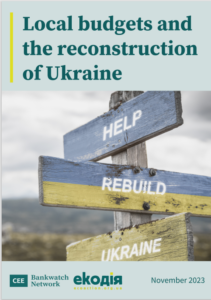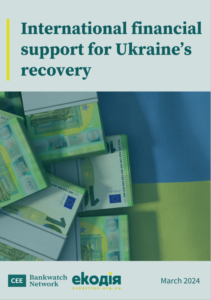The scale of destruction caused by Russia’s aggression against Ukraine has been staggering. To repair the damage, joint efforts to coordinate donations and properly plan Ukraine’s reconstruction must start as soon as possible.
A successful reconstruction of Ukraine cannot happen without involvement of the Ukrainian people. That’s why we’re calling on international donors to ensure that the financial structures to help impacted communities are put in place and that civil society groups have a say in this process.
We believe that Ukraine and the international community have a unique opportunity to modernise the country while addressing people’s needs and long-term sustainability.
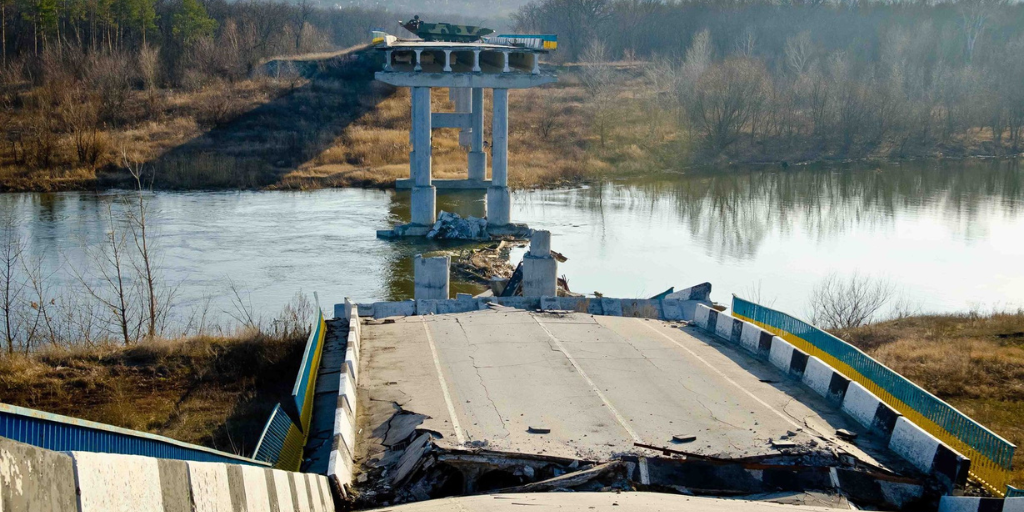
Stay informed
We closely follow international public finance and bring critical updates from the ground.
Key facts
- In February 2014, Russia invaded Ukraine in an unprovoked act of aggression on a sovereign country with its occupation of Crimea and territories in eastern Ukraine. On 24 February 2022, Russia launched a full-scale war on Ukraine that has claimed thousands of lives and displaced millions.
- According to a joint report by the World Bank, the Ukrainian government and the European Commission, an estimated USD 349 billion was needed for the recovery as of 1 June 2022; this figure is certain to increase as the war progresses.
- In May 2022, the European Commission committed to creating the ‘Rebuild Ukraine’ platform to coordinate financial institutions and donor organisations.
- In June 2022, Ukraine was awarded EU membership candidate status, requiring Ukraine’s economy and policies to align with those of the EU and the reconstruction process.
- In July 2022, the Ukraine Recovery Conference was held in Lugano, Switzerland where a draft National Recovery Plan was presented. Participating states endorsed the Lugano Declaration, which recognises Ukraine’s Recovery and Development Plan as the overarching recovery framework, engages multi-stakeholder participation and partnership, prioritises funding transparency and accountability, and ensures gender equality.
- In October 2022, the International Expert Conference on the Recovery, Reconstruction and Modernisation of Ukraine took place in Berlin. Regrettably, discussions on the involvement of different sectors and actors, mapping investment needs and coordinating action failed to deliver any concrete plans.
- In December 2022, the ‘Standing with the Ukrainian People’ conference took place in Paris to accelerate donations to meet Ukraine’s needs and coordinate aid. It also marked the commencement of G7 donor coordination.
- In January 2023, the first meeting of the Steering Committee of the Multi-agency Donor Coordination Platform for Ukraine took place, an initiative of G7 countries and the Ukrainian government.
- In February 2023, leaders of the European Council and the European Commission met Volodymyr Zelenskyy in Kyiv for the first EU–Ukraine summit since the start of Russia’s invasion. They discussed, among other topics on the agenda, Ukraine’s EU accession process, recovery and reconstruction. In a joint open letter to the EU Commission, we highlighted the importance of civil society involvement and environmental reforms in line with the European Green Deal for Ukraine’s accession and reconstruction.
Key issues
- Without clarity and coordination among donors on a partnership principle and shared climate targets, investment projects might not address regional and local needs or future challenges, such as the climate crisis.
- Without proper structures to ensure public participation, Ukrainian and international civil society groups have limited opportunities to influence the reconstruction process.
- Ukraine’s recovery and reconstruction will be held in parallel with the accession process and, as such, all plans should align with EU aquis from the very beginning.
Background
Russia’s full-scale invasion has caused untold destruction to Ukraine’s housing, industry, energy and social infrastructure, nature, environment and economy. According to a joint report by the World Bank, the Ukrainian government and the European Commission, an estimated USD 349 billion was needed for recovery as of 1 June 2022. This figure is certain to increase as the war progresses. Joint efforts to coordinate donations and properly plan Ukraine’s reconstruction must start now.
In May 2022, the European Commission committed to creating the ‘Rebuild Ukraine’ platform to coordinate financial institutions and donor organisations. In June 2022, Ukraine was awarded EU membership candidate status. As such, alignment of Ukraine’s economy with that of the EU is critical to the financing of Ukraine’s reconstruction, which must also sync with the goals of the European Green Deal.
In April 2022, the Ukrainian government established the National Council for the Recovery of Ukraine to prepare for the post-war reconstruction and development of the country from 2022 to 2032. The first national short-term development plans were presented in early July. However, they lacked priorities and there was a notable absence of any holistic vision for the country’s development. They also failed to reflect regional development needs and made no provision for inclusive bottom-up participation.
Led by the Ukrainian authorities, the reconstruction will be planned in close partnership with the European Union and other key partners, such as the G7, G20 , as well as international financial institutions and organisations.
Meanwhile, Ukrainian civil society organisations have developed green principles to guide environmentally sustainable economic and social reconstruction. According to these, the country should be rebuilt using the best available technologies and meet international standards.
On the reconstruction front line: Ukrainian municipalities and the funding landscape
Ukrainian municipalities, local governments, citizens and volunteers are all on the front line. Not only do they face the challenges of war, but they also have to rebuild damaged infrastructure, assist internally displaced persons, provide basic services to the population, and support the army. But is there enough money to fund their vital efforts? And do municipalities have sufficient access to existing financial resources?
Bankwatch’s research series looks at the complex landscape of existing funding available to Ukrainian municipalities as they seek to meet their reconstruction needs. Read the summary of this research series here.
Accessing domestic and international financial resources for reconstruction efforts at the national level
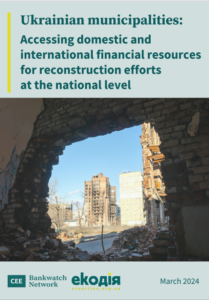
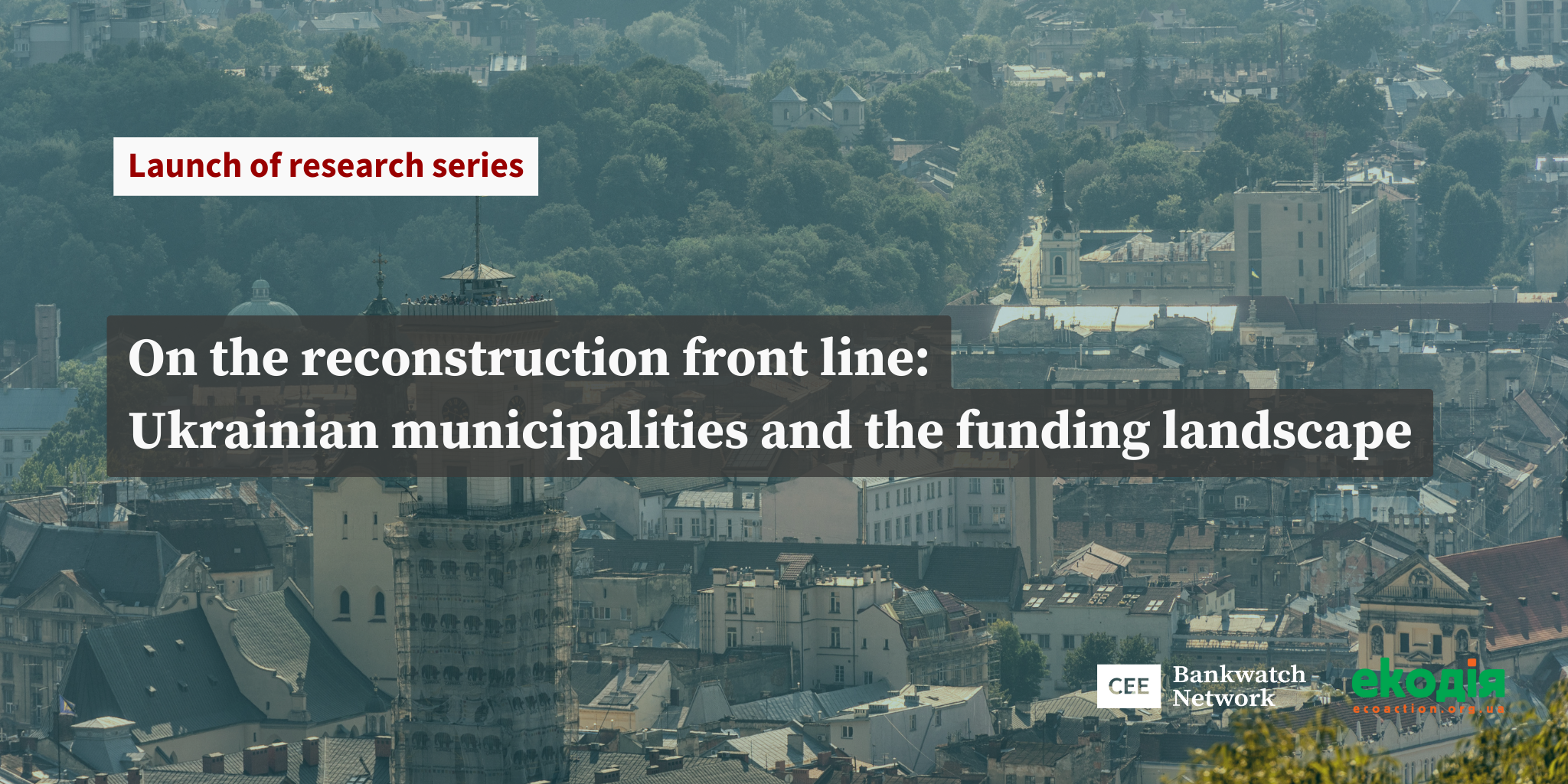
On the reconstruction front line: Ukrainian municipalities and the funding landscape
Event | 28 March, 2024At this online event, we launched a series of reports entitled ‘On the reconstruction front line: Ukrainian municipalities and the funding landscape’ which explores the availability of funding for municipalities at local, national and international levels.
Read more
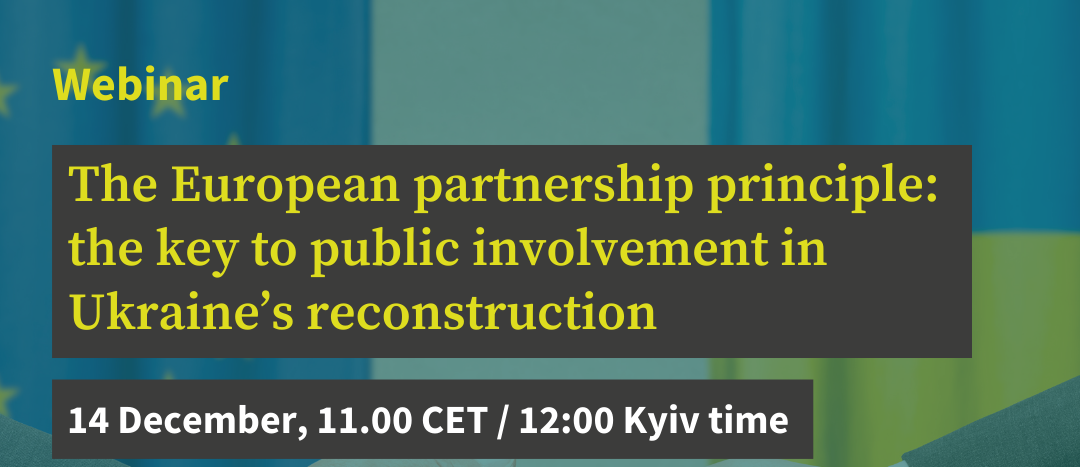
The European partnership principle: the key to public involvement in Ukraine’s reconstruction
Event | 14 December, 2023Ukraine’s reconstruction will involve rebuilding towns, infrastructure, industry, schools, hospitals, as well as water and energy utilities. As the massive financing proposals and recovery plans for Ukraine take shape, the participation of the wider public in the decision-making and scrutiny of these documents is urgently needed.
Read more
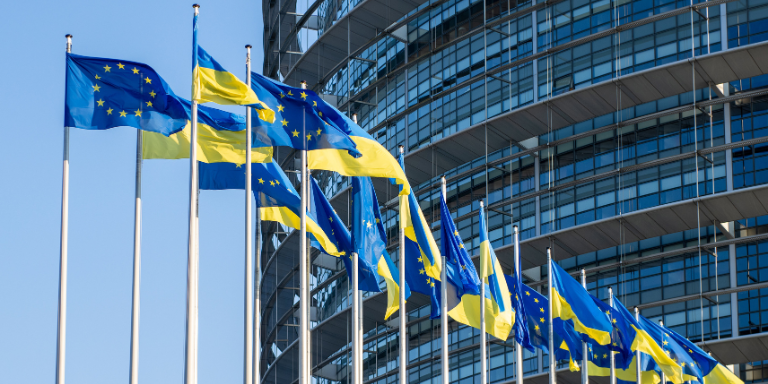
All you need to know about the Ukraine Facility
Event | 17 October, 2023How will the Ukraine Facility work and what role will the EU institutions play in its design? How can civil society get involved now and in the future? And how can we build on the experiences of EU countries in implementing the European Code of Conduct on Partnership?
Read more
Why do we need to invest in electric urban transport in the reconstruction of Ukraine?
Why should electric urban transport be prioritised in the reconstruction of Ukraine’s cities? The city of Chernihiv is an example of how Ukrainian cities are rebuilding their public transport systems following massive destruction. Although the investment needs for transport reconstruction are high, Ukraine now has a unique opportunity to rebuild clean, green, comfortable and attractive transport systems.
Latest news
Restoring the Dnipro: Ukraine’s water crisis and the path to Europe
Blog entry | 1 July, 2025The critical task of protecting and preserving Ukraine’s water resources presents significant challenges. To address these issues, the environmental community has initiated discussions on implementing effective water management across the country, with a particular focus on rehabilitating its principal waterway – the Dnipro River.
Read moreInternational agribusiness ambitions leave local impacts in Ukraine: A case of Environmental Impacts from poultry producer MHP
Story | 17 April, 2025Ukraine’s largest poultry producer, Myronivsky Hliboproduct (MHP), has received over a billion dollars in loans from international development banks since 2010 and has significantly expanded its operations. Local communities and environmental advocates argue that the company has failed to adequately address concerns regarding its environmental impact. This analysis examines the environmental issues surrounding MHP’s Vinnytsia Poultry Farm, focusing on water quality concerns and what appears to be insufficient environmental monitoring, to highlight what many stakeholders perceive as an urgent need for enhanced oversight of large agribusiness operations in Ukraine.
Read moreGuidelines for selecting just transition projects in Ukraine
Blog entry | 20 February, 2025Despite the ongoing war, Ukraine remains steadfast in its commitment to a just transition. As an EU accession candidate, Ukraine must integrate the Just Transition Mechanism’s principles and criteria into its national policies. Since Ukraine plans to join the EU before its coal phase-out in 2035, the Just Transition Fund regulation provides the most relevant framework for meeting these requirements.
Read moreRelated publications
Cleaning up District Heating: Best technologies and real-life examples (Ukrainian)
Brochure | 18 December, 2025 | Download PDFIntended for practitioners, policymakers, civil society and the energy sector, this brochure reviews various public financing options that can help enable the transition to clean district heating.
Ukraine’s Single Project Pipeline: The challenges of reforming public investment management
Briefing | 12 November, 2025 | Download PDFThis briefing explores how Ukraine’s new Single Project Pipeline is reshaping public investment management.
EIB-funded urban public transport projects in Ukraine: Lessons from Ternopil and Lutsk
Briefing | 30 October, 2025 | Download PDFIn recent years, the European Investment Bank (EIB) has provided significant financial support aimed at modernising Ukraine’s urban transport systems. However, implementation challenges and major delays have stalled progress. This publication is also a
